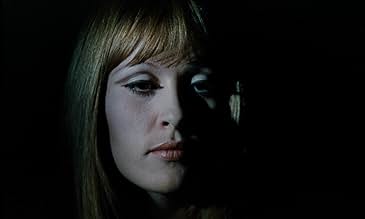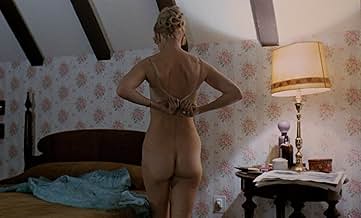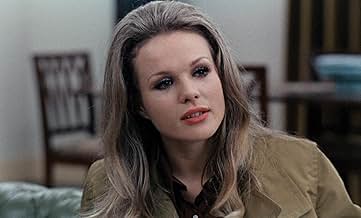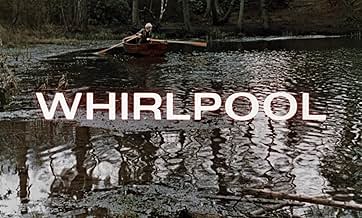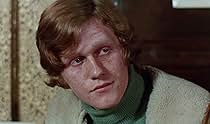A rich older woman living in a country house brings home a new model to be photographed by a young enigmatic photographer who lives with her. The unsuspecting girl becomes entangled in a web... Read allA rich older woman living in a country house brings home a new model to be photographed by a young enigmatic photographer who lives with her. The unsuspecting girl becomes entangled in a web of sex, abuse and death.A rich older woman living in a country house brings home a new model to be photographed by a young enigmatic photographer who lives with her. The unsuspecting girl becomes entangled in a web of sex, abuse and death.
- Director
- Writers
- Stars
- Director
- Writers
- All cast & crew
- Production, box office & more at IMDbPro
5.5726
1
2
3
4
5
6
7
8
9
10
Featured reviews
Jose Larraz's recently unearthed first film
This is the first film of the cult Spanish expatriate director Jose Larraz (which was lost until very recently). It is far more amateurish than his later (and better) films like "Symptoms", "Vampyres", and "The Coming of Sin", but it has the same basic themes--omnivorous sexual perversity played out against a background of haunting natural beauty. A Swinging London era fashion (played by Vivian Neves, who was a, um, Swinging London Era fashion model)is lured to an isolated country estate by a creepy older woman to meet her even creepier photography-obsessed nephew. She doesn't seem too perturbed to learn that a previous female model that went there has disappeared without a trace, nor does she find it strange that her first night there the aunt and nephew get her drunk and engage her in perverse game of strip poker. She almost has sex with the nephew (while his aunt secretly watches) but he isn't able to, uh, rise to the occasion. The next day he takes her into town and pays a friend to rip her clothes off and nearly rape her while he takes pictures. This doesn't seem to bother her either because soon she's involved in another bisexual three-way sex/photography session with the aunt and nephew. There is also an allusion to the old Bluebeard story--the model has been forbidden to enter the nephew's mysterious darkroom. Hmmmm. Guess what she does?
This movie was written off as a cheap sex movie when it was released, even though it doesn't really contain any more sex than any other Larraz movie. The problem is that just isn't very good. It kind of reminded of the sexy Italian giallo "Amuck!" released a few years later, but it lacks both the strong acting and the directorial flair of that movie. It's also hard to muster much sympathy for the protagonist as she is unbelievably stupid. And there's no doubt from the beginning that the villainous couple are the worst kind of creeps (and the actors that play them might as well be twirling their mustaches). You can see the ending coming from a mile away--the tagline and the alternative title pretty much give it away. There is also a really lame voice-over coda before the end credits, which was no doubt added to ameliorate the censors. Still this IS a J.R. Larraz movie, so it is not entirely uninteresting and worth seeing if you're a fan of the director like I am.
This movie was written off as a cheap sex movie when it was released, even though it doesn't really contain any more sex than any other Larraz movie. The problem is that just isn't very good. It kind of reminded of the sexy Italian giallo "Amuck!" released a few years later, but it lacks both the strong acting and the directorial flair of that movie. It's also hard to muster much sympathy for the protagonist as she is unbelievably stupid. And there's no doubt from the beginning that the villainous couple are the worst kind of creeps (and the actors that play them might as well be twirling their mustaches). You can see the ending coming from a mile away--the tagline and the alternative title pretty much give it away. There is also a really lame voice-over coda before the end credits, which was no doubt added to ameliorate the censors. Still this IS a J.R. Larraz movie, so it is not entirely uninteresting and worth seeing if you're a fan of the director like I am.
Whirlpool
A diplomatic person might call this an erotic thriller. Diplomacy is for diplomats, and no amount of tact can gloss over it. This low budget film is not total rubbish, but only if you like lesbian sex, simulated rape and the odd murder, and these are odd murders.
A woman lives in the country with her ersatz nephew who is also her bedmate, well, they do it on the floor. Sonny boy is a photographer, naturally he likes photographing attractive young ladies, and, you guessed it, frightened young ladies. Before the film starts, a girl has already been murdered - we see a flashback of that later. The lady of the house is apparently ignorant of his murderous proclivities, but someone is suspicious, namely the sugar daddy of the first girl, who gets a bit too nosey for his own good.
The man with the camera also has an ad hoc accomplice who provides the sexual assaults while he takes the pictures. What more do you need to know? The film is atmospheric, but it is very slow in places. Thankfully, justice is done at the end, although we don't actually see it, and of course it comes too late for his next victim.
A woman lives in the country with her ersatz nephew who is also her bedmate, well, they do it on the floor. Sonny boy is a photographer, naturally he likes photographing attractive young ladies, and, you guessed it, frightened young ladies. Before the film starts, a girl has already been murdered - we see a flashback of that later. The lady of the house is apparently ignorant of his murderous proclivities, but someone is suspicious, namely the sugar daddy of the first girl, who gets a bit too nosey for his own good.
The man with the camera also has an ad hoc accomplice who provides the sexual assaults while he takes the pictures. What more do you need to know? The film is atmospheric, but it is very slow in places. Thankfully, justice is done at the end, although we don't actually see it, and of course it comes too late for his next victim.
I miss this from days gone by
I saw this in the theater way back when.My memory fails over the years but I wish I could see it again.I remember it as a slezzy sort of teasing film except for the ending.Thats what made the film and why so many try to find it today.Alas with no luck.If you can find it,tell the WORLD!!
One amazing performance in a well-shot, but really nasty grindhouse classic
I had read about this notorious, X-rated grindhouse classic for years, and finally watched it over the holidays. It's shockingly brutal, nihilistic and sexual, even by today's standards. The debut feature of Jose Larraz, a Spanish director known for high-end sleaze, a la Jess Franco, it's quite well-shot, but has a script that's nearly non-existent and shamelessly rips-off better, iconic films such as PSYCHO, PEEPING TOM and REBECCA. Lead actress Vivien Neves was a stunning supermodel in her day, but couldn't act wet in a rainstorm. The actress who really made an impression is a Danish woman (it was a co-production between Denmark and Spain, but shot in the UK) named Pia Andersson, as the evil "Aunt Sarah." She has several exquisite moments, mostly without dialogue, where her remarkable face displays a host of emotions, mostly pain and loneliness. And the odd thing is, she seems to have vanished after this film. I can find nothing about her on the 'net. Very strange. The ending, which I'm sure influenced Wes Craven's LAST HOUSE ON THE LEFT several years later (even more so than Bergman's VIRGIN SPRING, which it shamelessly ripped off) is truly sickening and disturbing, and has stayed with me for the past week, not in a good way. Ultimately, this is one of those films made right after the rating system was established where the sole purpose was "Anything goes!" and boy, does it. Interesting as a time capsule artifact, but ultimately, it's pretty pointless, not to mention very, very nasty.
Gripping thriller: creepy, lurid but engrossing
Not as vile as other reviews have suggested, although certainly sordid and lurid, but it also does a great job of building tension and an uncomfortable mood and is a worthwhile thriller.
Young aspiring fashion model Tulia visits the country house of Sarah and her "nephew" Theo, under a pretence that Theo is something of a young prodigy who will take brilliant photos of Tulia to kick-start her career. However, the ulterior motive is to be a toy in Sarah's regular threesomes. An air of danger and mystery is established early on due to the unsatisfying explanations given regarding the disappearance of Sarah's previous lover, Rhonda, who stayed at the house under similar circumstances. The film presents several possible culprits, including Theo, Sarah, a strange flute-playing figure in the woods and a possible supernatural element.
The performances are good, with. Karl Lanchbury as Theo being particularly memorable. He is creepy, manipulative and yet charismatic enough to keep Tulia and the audience guessing as to his motivations.
The ending is a little disappointing and abrupt; it really just goes through some predictable motions and ends on a sordid and unpleasant note. All in all, though, this is an effective and gripping thriller.
Young aspiring fashion model Tulia visits the country house of Sarah and her "nephew" Theo, under a pretence that Theo is something of a young prodigy who will take brilliant photos of Tulia to kick-start her career. However, the ulterior motive is to be a toy in Sarah's regular threesomes. An air of danger and mystery is established early on due to the unsatisfying explanations given regarding the disappearance of Sarah's previous lover, Rhonda, who stayed at the house under similar circumstances. The film presents several possible culprits, including Theo, Sarah, a strange flute-playing figure in the woods and a possible supernatural element.
The performances are good, with. Karl Lanchbury as Theo being particularly memorable. He is creepy, manipulative and yet charismatic enough to keep Tulia and the audience guessing as to his motivations.
The ending is a little disappointing and abrupt; it really just goes through some predictable motions and ends on a sordid and unpleasant note. All in all, though, this is an effective and gripping thriller.
Did you know
- TriviaThe film disappeared for several decades until Arrow Video restored it and re-released it on Blu-ray in 2019.
- GoofsDuring the striptease card game, the bottle of liquor moves from one side of the table to the other, in back-to-back shots. Also, the amount of liquor in the bottle goes from half-full to nearly empty.
- Alternate versionsBritish censors cut lesbian sex scenes between Tulia and her aunt, a woodland rape, and a bedtime threesome.
- ConnectionsReferenced in Drive-in Movie Memories (2001)
- How long is Whirlpool?Powered by Alexa
Details
- Release date
- Countries of origin
- Language
- Also known as
- Perversion Flash
- Filming locations
- England, UK(location)
- Production company
- See more company credits at IMDbPro
Contribute to this page
Suggest an edit or add missing content


